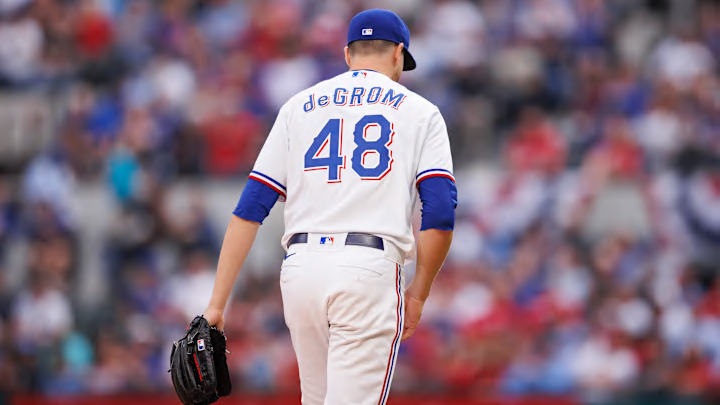In a recent announcement, the Texas Rangers revealed that their star pitcher, Jacob deGrom, will undergo Tommy John surgery for a UCL tear in his right elbow. This news has significant implications for deGrom's future in the game, as well as the financial obligations of the Rangers, who are set to pay him a substantial amount this year despite his limited appearances. In this follow-up article, we delve into the definition and consequences of a UCL tear and discuss the potential impact on deGrom's career post-surgery.
The UCL (ulnar collateral ligament) is a critical ligament in the elbow joint that provides stability during the throwing motion. A UCL tear occurs when this ligament becomes damaged or ruptured, often due to the repetitive stress placed on it during high-velocity pitching. The UCL tear is a common injury among pitchers, and its severity can range from minor strains to complete tears.
For Jacob deGrom, who has already established himself as one of the game's premier pitchers, the UCL tear presents significant challenges. Tommy John surgery, a procedure named after the first player to undergo it, involves reconstructing the torn ligament using a graft from another part of the body or a donor. While the surgery has a high success rate, the recovery period is lengthy, typically 12 to 18 months.
After the surgery, deGrom must undergo a comprehensive rehabilitation program to regain strength, mobility, and proper throwing mechanics. The aim is to gradually reintroduce him to pitching, starting with light throwing and progressing to more intense bullpen sessions and simulated games. It is crucial to proceed cautiously during this process to minimize re-injury risk and ensure a successful return to the mound.
But it is not all bad news.
A recent Orthopaedic Journal of Sports Medicine study (2022) shows that the surgery works very well. This study aimed to evaluate the outcomes of a novel ulnar collateral ligament (UCL) graft repair technique for professional baseball players who had experienced re-rupture after a previous UCL reconstruction. Six players who met the inclusion criteria underwent UCL graft repair and flexor-pronator tendon repair.
Follow-up assessments were conducted, including patient-reported outcomes and performance metrics. The results showed that no players experienced re-rupture after the UCL graft repair. Four out of the six pitchers (67%) could return to professional pitching at an average of 17 months post-surgery. Additionally, three of the six players (50%) achieved an excellent outcome, indicating a return to their previous sport level.
Furthermore, there were no significant differences in performance statistics before and after the procedure for the players who returned to professional pitching. The study suggests that UCL graft repair can yield comparable rates of return to play and performance compared to revision UCL reconstruction, making it a viable alternative for proximal avulsion ruptures of the UCL graft.
Based on this study deGrom may be back on an MLB in late 2024 or even 2025. So, what's going to happen with this season?
The Texas Rangers are facing a unique situation with deGrom's injury. Despite being unable to contribute on the field, the team is obligated to pay him a significant amount this year due to the terms of his contract. The decision to sign deGrom to a 5-year, $185 million deal raises questions about the risks involved in investing such a substantial sum in a player with an injury history.
In just six appearances, deGrom maintained an impressive ERA of 2.67, accompanied by a 2-0 win-loss record. Throughout 30.1 innings pitched, he has recorded 19 strikeouts and has given up only 11 earned runs. Moreover, deGrom had established himself as a dominant presence with an impressive WHIP of 0.758 and an exceptional K/9 ratio of 13.4. These statistics testify to deGrom's immense talent and the significant impact he brings to the Texas Rangers pitching rotation whenever he takes the field.
Given deGrom's injury history and the financial investment made by the Texas Rangers, it is essential to explore alternative roles that can maximize his impact and prolong his career. As mentioned in previous articles, one potential solution is transitioning deGrom to the closer role, which would involve shorter outings and a reduced overall workload. While this shift may minimize the risk of immediate harm, it is essential to note that cumulative high-velocity pitches over multiple outings can still contribute to chronic overuse injuries over time.
Jacob deGrom's UCL tear and subsequent Tommy John surgery pose significant challenges for both the pitcher and the Texas Rangers. The surgery and rehabilitation will require careful management to ensure a triumphant return to the mound.
The financial implications of deGrom's contract further intensify the pressure to find a suitable role upon his return. Transitioning deGrom to the closer role offers potential benefits, but it must be approached cautiously, considering the player's and team's long-term health and competitive aspirations. Ultimately, the decision should prioritize deGrom's longevity in the game while aligning with the Texas Rangers' competitive goals.
